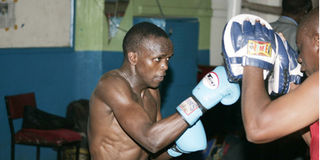What it takes to qualify for the Olympic Games

Kenya’s bantamweight boxer Benson Gicharu (left) during a past training session.
What you need to know:
- Qualification standards exist where the number of competitors wishing to participate in an event is larger than the number of spaces available
- The qualification period begins four years before the Opening Ceremony for the Games of that quadrennial
- Each sport has a different path line, which includes the standards being set by the respective international federations
A story is told of two-time Olympian, Benson Gicharu, who flew to Venezuela as if by a miracle, without a visa, in his third and last attempt to qualify for a spot in the boxing event of the Rio Olympic Games in 2016.
Gicharu had participated in the African Qualifying Event and lost in the second round. He had the second chance to qualify through the World Qualifying Event, which he managed to participate in and for the second time, missed the chance to represent the country when he lost in the quarter-finals. His final chance remained the final qualification event in Venezuela, which he won following his miraculous travel to the South American nation.
This is an example of the pathway to participating in Olympic Games. Before any athlete can compete at the Games, they need to qualify.
Qualification standards exist where the number of competitors wishing to participate in an event is larger than the number of spaces available. The qualification period begins four years before the Opening Ceremony for the Games of that quadrennial.
Each sport has a different path line, which includes the standards being set by the respective international federations. There is no general rule and it can sometimes be very confusing to try and understand everything.
For team sports, there are host country places, region qualification, confederation qualification, international federation qualifying tournaments, points-based world rankings for the best players, and play-off matches. Some have direct qualification events while others have qualification based on a cumulative world ranking list or may use a combination of both.
In individual sports, the path line is almost the same, with some, quota spots being allocated directly to the athletes who earn them. While in others, the quota spots go to the National Olympic Committee (NOC), which means there is a separate selection process within the country — such as national trials — to fill those spots. This is the case of for example athletics, Kenya’s biggest team to every Olympics. For individual events, there’s the set maximum of three athletes per NOC, with a maximum of two teams per NOC per team event and one relay team per NOC for relay events.
In view of Kenya sending a strong team in terms of numbers, we do not get to benefit from the universality slots because the country is well represented.
With 544 days to 2024 Paris Olympics, National Olympic Committee of Kenya is walking the journey with national federations through having regular consultative meetings to discuss their qualification pathways, qualified athletes, and allocation of resources to give athletes the best chance of representing the country.
The year 2023 is significant for NOC-K, with most qualifying events already scheduled. This time there is a target of qualifying at least two sports that have not featured in Team Kenya to the Olympics before.
Mutuku is the Secretary General at the National Olympic Committee of Kenya.





